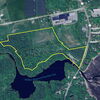Processing Your Payment
Please do not leave this page until complete. This can take a few moments.
- News
-
Editions
View Digital Editions
Biweekly Issues
- November 17,2025
- November 03, 2025
- October 20, 2025
- October 6, 2025
- September 22, 2025
- September 8, 2025
- + More
Special Editions
- Lists
- Viewpoints
-
Our Events
Event Info
Award Honorees
- Calendar
- Biz Marketplace
Road map for struggling biomass industry?
A commission created by the 127th Legislature to study the economic, environmental and energy benefits of Maine's biomass industry has delivered its final report to two legislative committees with 15 recommendations for consideration in the new legislative session.
The 24-page report draws on input from stakeholders in Maine's forest products sector, which contributed $8.5 billion to the state's economy in 2016 but which has seen a loss of $1.3 billion in total economic impact, largely due to closures at six paper mills in the past three years and the related decline in employment from 16,551 jobs in 2014 to an estimated 14,563 in 2016.
An additional complication was the closure last March of Covanta Energy's biomass power plants in West Enfield and Jonesboro, resulting in the loss of 44 jobs at those facilities as well as important markets for low-grade wood and waste wood left over from pulp and paper manufacturing and sawmills. Covanta has since been purchased by Stored Solar, a subsidiary of the French energy firm Capergy. In mid-December, Maine's Public Utilities Commission split $13.4 million in subsidies between the state's other biomass power company, ReEnergy Holdings, and Covanta. A Dec. 28 PUC order subsequently approved an energy agreement between Stored Solar and Central Maine Power, putting the former Covanta plants on track for resuming power generation from biomass.
Those two-year contracts at above-market rates were never seen as anything more than a stop-gap effort to buy time for Maine's biomass power plants, which lost above-rate payments for their electricity when Massachusetts changed its Renewable Portfolio Standard policy to require greater efficiency than standalone plants can easily deliver. In effect, Massachusetts penalized plants that generate only electricity without capturing the heat that's produced.
“These new standards are very difficult to achieve for a standalone biomass facility,” the biomass commission's final report states. “This loss of revenue and the possibility of changes in policy in other states have created a great deal of uncertainty for biomass facilities, and Maine's current renewable portfolio standards do not provide any buffer.”
Goals and recommendations
The biomass commission held five public meetings and solicited suggestions from stakeholders, including in-state and out-of-state utility regulators, Efficiency Maine Trust, pellet companies, loggers, biomass experts, pulp and paper companies and land owners.
It developed five broad goals:
- Encourage investment in biomass facilities and promote greater efficiency
- Encourage investments in combined heat and power systems to promote efficiency
- Enable and encourage co-location and other innovative projects utilizing “behind-the-meter” technologies to encourage manufacturing growth and increase system reliability
- Promote and develop Maine's forest-related resources, both in-state and abroad, and take advantage of federal grant funding and other collaborative efforts to bolster the forest-based economy in Maine
- Create state policies that encourage biomass energy production and heating with biomass.
The 15 recommendations provide ample guidance for lawmakers, with specific suggestions to amend existing state laws with the goal of assisting and encouraging further investment in the biomass industry. Two suggestions involve amending the state's renewable portfolio standards to encourage using biomass for heating and to extend “new renewable capacity” portfolio requirements beyond 2017.
Other suggestions include: “Amend existing laws to explicitly allow microgrids statewide” and creating incentives for “schools and other public institutions to convert to combined heat and power systems.”
Read more
Status of Stored Solar biomass plants uncertain
Potential investor withdraws $5M loan offer to biomass company
Mainebiz web partners

The Giving Guide
The Giving Guide helps nonprofits have the opportunity to showcase and differentiate their organizations so that businesses better understand how they can contribute to a nonprofit’s mission and work.
Learn More
Work for ME
Work for ME is a workforce development tool to help Maine’s employers target Maine’s emerging workforce. Work for ME highlights each industry, its impact on Maine’s economy, the jobs available to entry-level workers, the training and education needed to get a career started.
Learn More
Groundbreaking Maine
Whether you’re a developer, financer, architect, or industry enthusiast, Groundbreaking Maine is crafted to be your go-to source for valuable insights in Maine’s real estate and construction community.
Learn more-
The Giving Guide
The Giving Guide helps nonprofits have the opportunity to showcase and differentiate their organizations so that businesses better understand how they can contribute to a nonprofit’s mission and work.
-
Work for ME
Work for ME is a workforce development tool to help Maine’s employers target Maine’s emerging workforce. Work for ME highlights each industry, its impact on Maine’s economy, the jobs available to entry-level workers, the training and education needed to get a career started.
-
Groundbreaking Maine
Whether you’re a developer, financer, architect, or industry enthusiast, Groundbreaking Maine is crafted to be your go-to source for valuable insights in Maine’s real estate and construction community.
ABOUT
NEW ENGLAND BUSINESS MEDIA SITES
No articles left
Get access now
In order to use this feature, we need some information from you. You can also login or register for a free account.
By clicking submit you are agreeing to our cookie usage and Privacy Policy
Already have an account? Login
Already have an account? Login
Want to create an account? Register
Get access now
In order to use this feature, we need some information from you. You can also login or register for a free account.
By clicking submit you are agreeing to our cookie usage and Privacy Policy
Already have an account? Login
Already have an account? Login
Want to create an account? Register







Comments